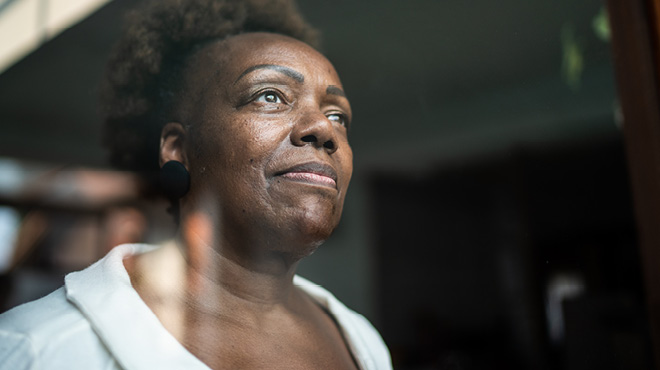Recent Posts
Seasonal affective disorder: Not just the winter blues

For many, the winter season is a joyous time filled with family, friends and great food. However, for others, winter months can be quite the opposite. Shorter days, cold weather and stress from the holidays can be challenging, leading to increased stress, sadness and even depression.
While it may seem like "just the winter blues," some people may experience more persistent, pervasive symptoms of depression known as seasonal affective disorder.
Why does seasonal depression increase in the winter?
Seasonal affective disorder, or SAD, is a form of major depression that some people commonly suffer from in the late fall and winter months. And more rarely, it may occur in early spring.
Research shows that the greater the distance you live north or south of the equator, the greater the incidence of SAD cases. In the U.S., people are more likely to have SAD in the North than in the South.
An explanation may be that reduced levels of sunlight disrupt the body's internal clock and may change the levels of serotonin, which affects mood, or melatonin, which plays a role in sleep patterns and mood.
People tend to stay indoors more often when it's cold and dark. This can increase isolation and decrease the opportunity to share enjoyable activities with others, further contributing to sadness and depression.
In addition, people may be less physically active or not exercise as much during winter, which can impact their sense of well-being.
Those most likely to suffer from SAD are females and people with a family or personal history of mood disturbance. SAD is uncommon, although not unheard of, in those younger than 20 and older adults.
Common symptoms of seasonal affective disorder include:
- Depressed mood, such as feeling more sad, down or numb
- Irritability or mood swings
- Problems getting along with others
- Fatigue and oversleeping
- Appetite changes, such as craving high-carbohydrate foods
- Weight gain
In the early spring, symptoms may include:
- Depression
- Trouble sleeping
- Anxiety
- Weight loss
People struggling with SAD are more likely to experience increased appetite, weight gain or hypersomnia (sleeping too much) compared to those with major depressive disorder without a seasonal variation.
If you suspect that you or someone you care about may be struggling with SAD, seeking help from a qualified professional is the first step to feeling better.
An evaluation by your health care team or a mental health counselor is crucial. SAD can lead to serious complications, such as social withdrawal, school and work problems, substance abuse, and suicidal thoughts or behaviors.
Contributing factors for seasonal affective disorder
SAD is thought to be caused by the seasonal change in exposure to light in the environment that occurs in the fall, winter and spring months. These changes may affect the amount of the hormone melatonin produced by the body in some people, resulting in abnormalities in neurotransmitters in the brain, such as norepinephrine, serotonin and dopamine.
Melatonin, produced in the brain's pineal gland and triggered by darkness, influences the sleep/wake cycle. In the cold winter months, when you are more likely to stay indoors and daylight hours are shorter, increased melatonin production in those susceptible can increase the occurrence of SAD.
Serotonin, a neurotransmitter in the brain, is believed to have a role in regulating mood. Serotonin levels also may decrease in response to a reduction in daylight hours, resulting in symptoms of depression. Some people experience an increased craving for carbohydrates during low-light months, as carbohydrates help generate serotonin production.
Stress during the holidays can contribute to depression. Feeling pressure from others, yourself or your bank account can trigger an emotional roller coaster. These situations are all too common during the holiday season when buying gifts, planning holiday events and spending time with family.
The holidays can be trying times for people who are separated from their loved ones by distance or death. Dealing with the absence of loved ones during the holidays – especially if they have passed away – can elicit strong emotions and episodes of depression.
Coping with seasonal affective disorder and lifestyle modifications
Some of the best ways to prevent or improve a depressed mood are simple, and you can start today:
- Eat a well-balanced diet. If you are not eating a nutritious diet, you are missing out on nutrients that promote a positive state of being. Specifically, consume foods such as fruits, vegetables, whole grains and nuts.
- Exercise moderately on a regular basis to improve your mood and energy levels.
- Get enough sleep. When you don't sleep enough, it affects your thoughts, mood and overall cognitive function. Sleep needs vary from person to person, but the National Sleep Foundation recommends between seven and nine hours for adults. Try to keep a consistent sleep schedule.
- Make time to interact with friends and loved ones. They supply a strong support system, which can help you deal with emotional difficulties. If a friend or family member is exhibiting symptoms of depression, reaching out to them can be helpful.
- Do something nice for someone else. Volunteering, donating to charity and performing random acts of kindness can be very rewarding. This is an effective way to add a spark back into your life.
Treatment interventions for seasonal affective disorder
Feeling sad or down now and then is a normal part of life — especially during difficult times or when mourning the loss of someone close to you. However, persistent feelings of sadness or hopelessness may be signs of depression.
It's time to contact your health care professional if these feelings interfere with your everyday life, you don't enjoy activities that you once did or you are having thoughts about suicide.
Evaluation and treatment for seasonal affective disorder may involve:
- Using a light box or bright light therapy may help alleviate SAD symptoms. When using bright light therapy or light box therapy, the light should be 10,000 lux. Light box therapy should be used in the morning, within the first hour of waking, for 30 minutes, such as while getting ready for work or eating breakfast. The light should be placed 1 to 2 feet from the face, making sure not to look directly at the light.
- Some people choose pharmacologic options to treat symptoms. Speak to your health care team to find out more about starting an antidepressant, such as a selective serotonin reuptake inhibitor (SSRI). Bupropion, an atypical antidepressant medication, is indicated by the Food and Drug Administration for seasonal affective disorder.
Other treatment interventions include:
- Individual assessment and evaluation for depression/SAD
- Lifestyle changes to increase exposure to natural light
- Individual therapy using evidenced-based treatments
- Support groups and classes
There are many qualified physicians and mental health counselors to assist in finding the help you need.
Patrick Bigaouette, M.D., is a psychiatrist in Psychiatry & Psychology in Mankato, Minnesota.






